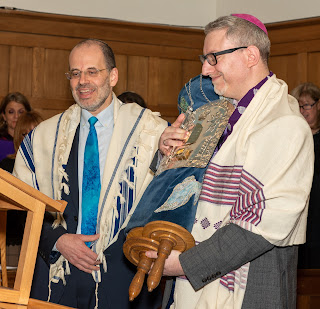This week’s Torah portion - the excerpt from the Hebrew Bible that Jews will read this week - is called Vayishlach. This story sees Jacob experience several key moments of transition and focus which help him to strengthen his, and his family’s, identity. Jacob’s estrangement from his brother Esau is finally reconciled allowing the two to depart, not as strangers, but as friends. For Jacob, this is the much needed antidote to fear and anxiety that have overshadowed him since the day he was born.
A short while later, and finally able to stop running, Jacob wanders alone and wrestles with a stranger - wrestles with his own identity and the next steps to take on his journey. As he looks to the future, he wonders what the next chapter of his life will hold and ponders the short and long term decisions he must now make. Through this wrestling Jacob eventually emerges as ‘Israel’ - a name acknowledging that, with Divine guidance, he will have the ability to plot a new course.
Later, in Vayishlach, God appears to Jacob (now Israel) and says to him:
Today, as I stand before you, to be inducted as your rabbi - I feel a little like Jacob. Whilst I can attest that my five years of rabbinical training at Leo Baeck College were very enjoyable - it was also a time of great internal wrestling... Not least, my time there enabled me to give meaningful consideration to my own understanding of what it means to be a rabbi and the role of the synagogue. Of course, the answer to both of these will continue to evolve. However, since taking up my position at Radlett Reform five months ago, I increasingly see that I have friends and colleagues to accompany me as I embark on this new journey.
How appropriate that my induction, and this week’s Torah portion, should coincide with my Bar Mitzvah anniversary - the Biblical portion I read to mark my coming of age at 13.
Radlett Reform is a very special community. Whilst somewhat geographically dispersed, its members are deeply connected to each other through a love of Jewish tradition and values. Above all of this is chesed - mutually reciprocal kindness! The kindness that emanates from Radlett Reform’s members is truly inspiring - this is a community based on generosity and I continue to be impressed at the many ways people support one another. Together, we will nurture this innate trait, and go further...
When reflecting on the ultimate role of a shul, my great-grandfather, Rabbi Abraham Kon, observed that:
"The synagogue is communal property. It serves as a magnet which draws the Jew to their people and their religion and unites the Jewish people into one nation. No regular synagogue-goer need be lonely or forlorn, for there [they] will find friends and well-wishers. If one is on occasion absent, their absence will be noted and inquiries made about it. Should they be sick, the members of their synagogue will visit them to help their recovery."
Of course, you don’t have to be a regular synagogue-goer, or Jewish, to feel the love and support of our community but these words help guide my own vision for Radlett Reform. Knowing you just a little, I think we are a good match for one another.
I see my role as rabbi as that of a guide. As I tread my own religious and spiritual journey I invite and encourage you to join me on this journey. Only together can we find a better, kinder way to navigate through a complex world.
I am exceedingly grateful to all those who helped me to reach this moment and give particular thanks to my wife Robin, and our children Aviva and Ora; and to my parents, siblings and friends. I am also grateful to the Movement for Reform Judaism, Leo Baeck College and my many, many teachers for their guidance, support and wisdom over the years. A particular mention is due to my friend and teacher Rabbi Dr Charles Middleburgh. I am excited to work alongside Rabbi Paul Freedman, the Synagogue team, and wider community to build on Radlett Reform's already strong foundation.
The Divine spark lives within each and every person - those with whom we have much in common and those with whom we (initially) find little that connects us.
As I take up my position as your Rabbi it is my hope that I will continue the legacy of my peers and family through continuing to practise a Judaism that is firmly rooted in chesed - reaching out and making meaningful connections with others.
Shavua Tov!

Comments